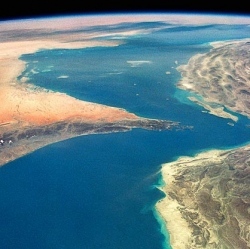
Earth’s atmosphere today looks much different compared to its primordial self from four billion years ago when it first formed. One explanation, new research shows, could be tens of thousands of small impacts from space rocks that obliterated this early atmosphere.
Scientists have long wondered the cause behind such dramatic atmospheric losses, and now a team from the Massachusetts Institute of Technology (MIT) may have found the answer. Around the time the Moon was formed, supposedly a relentless parade of small space rocks, or planetesimals, bombarded Earth, kicking up clouds of gas with enough force to permanently remove portions of the atmosphere and eject them into space. Such impacts may have even peeled off the atmospheres of other planets, such as Venus and Mars.
"[This finding] sets a very different initial condition for what the early Earth’s atmosphere was most likely like," researcher Hilke Schlichting said in a statement. "It gives us a new starting point for trying to understand what was the composition of the atmosphere, and what were the conditions for developing life."
You would think that one extremely massive smash would be most effective at wiping out the entire atmosphere – researchers even calculated that it would take an impact the size of Earth itself to do that. But it turns out that thousands of small collisions can do just as much damage.
